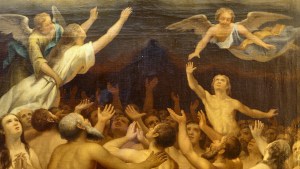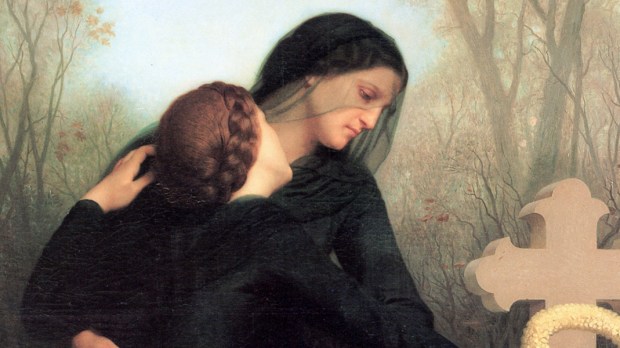I have always preferred All Souls Day, November 2, to All Saints Day, November 1 (though I love All Saints Day).
Maybe it’s because All Souls Day is active while All Saints Day feels passive. After all, on All Saints Day we celebrate because the saints in heaven can pray for us on earth — but on All Souls Day, we celebrate because our prayers on earth add souls to heaven that very day.
My family always visits a cemetery on All Souls Day to get the indulgence that releases souls into glory — but this year we can do that all month long. We should all do that. Urgently. A little history explains why.
The afterlife was joyless before Christ, and early Christians knew how good they had it.
In the Old Testament, the afterlife was not the goal of earthly life. We lived after death, but in Sheol, a “land of silence” where no one remembered or praised or experienced God.
But the “newer” Old Testament writings, closing in on the coming of Christ, started to change that understanding of death. Ezekiel and Daniel predicted a new future for souls, one that Isaiah saw would ultimately end death as we know it.
That’s why a good Jew like St. Paul erupted in paroxysms of joy when he contemplated death after Christ.
But as the years went on, many of us in the Christian West forgot that lesson.
You see it everywhere.
In 1600, Shakespeare’s Hamlet calls death “the undiscovered country from whose bourn no traveler returns” and the best Hamlet can hope for from his own death is an untroubled sleep or a “convocation of worms.”
In 1938, Thornton Wilder’s narrator in Our Town says “everybody knows in their bones that something is eternal, and that something has to do with human beings. All the greatest people ever lived have been telling us that for 5,000 years and yet you’d be surprised how people are always losing hold of it.” But then when the play depicts the afterlife, it is an uninspiring state of eternal waiting.
Pope Benedict XVI says most of us fall into that mode of thinking about the afterlife, and calls it a major reason people reject the faith: “To continue living for ever — endlessly — appears more like a curse than a gift,” he says, and we imagine that eternal life “can only be monotonous and ultimately unbearable.”
But Christ transformed death into the gateway to our true home.
“The Father’s house is our homeland,” says the Catechism. “Sin has exiled us … but conversion of heart enables us to return.”
Jesus calls our return home to heaven a wedding banquet. At the best wedding receptions, we immerse ourselves in a community of friends and family who together believe that a “happily ever after” has begun and bask in its glow.
Heaven is that, eternally — “not an unending succession of days in the calendar, but something more like the supreme moment of satisfaction,” says Pope Benedict, “like plunging into the ocean of infinite love, a moment in which time — the before and after — no longer exists … in which we are simply overwhelmed with joy.”
Jesus made death the gateway to that.
… but the urgency comes in when you realize that he also opened up another possibility.
God is love, and in order to enter his presence we must love. But in order to love, we must also be free. And freedom cuts both ways.
“Mortal sin is a radical possibility of human freedom, as is love itself,” says the Catechism. Mortal sin causes “the eternal death of hell” because “our freedom has the power to make choices for ever, with no turning back.”
After all, God is an “all consuming fire” and an “unapproachable light,” and only by entering into his life can we be in his presence.
Which brings up another possibility. “The ‘living flame of love,’” of God, says St. John Paul II, “is above all a purifying fire” — Purgatory. “It is love that demands purification, before man can be made ready for that union with God which is his ultimate vocation and destiny.”
This puts the afterlife in a whole new life. Purgatory is not the silent country of Sheol or the raucous party of heaven or the eternal darkness of hell. It is a purifying fire — where Christians like us are straining to get to God. Help them out!

Read more:
What does purgatory look like?

